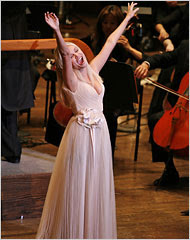Broadway, Music worthy of a listen
I am a fan of Broadway, particularly the musicals. I have long felt the modern Broadway composers, such as Hamlisch, Sondheim and Schwartz have often been overlooked by the classical world because of the "simplicity" of Broadway music. This is an unfortunate misconception. Anyone who has ever tried to sing a Sondheim score knows just how difficult the music can be. While Hamlisch and Schwartz tend to be more strophic in their song composition, even they come up with elements of music that are challenging for even the most accomplished performers.
The range a vocalist needs to be adept at for most Broadway music leads exceeds most lead roles by Mozart. Occasionally, Mozart uses the ultra high coloratura Soprano range, but as this range is often more effectual (pyrotechnics) and not necessarily good for understanding the words Broadway tends to avoid it's use - as the words are important. Which points to another difference between opera and Broadway; the libretto in opera, particularly in late 20th century opera, tends to be obtuse, more dealing with the inner struggle than the dialogue between characters. In the Broadway musical, the lyrics are meant to be more like conversation. Plays without music often allow the dialogue to be false, so the audience has to extrapolate thoughts behind the words rather than the words themselves. Plays with music (musicals) are more direct; the actors sing what they are thinking/feeling. This is a generalization, but true in most cases. This doesn't preclude sub-text. Sweeney Todd is filled with sub-text, as is Wicked and A Chorus Line. It's possible to sing some of the songs with a single dimension, and ignore the subtleties, but it is just as possible to dive deep into them and glean as much as you might with an opera libretto.
So, what of the music? Opera was long considered the place for innovation, the place where new forms were explored. But somewhere in the early 20th century the demand that opera be sung in a certain manner restricted opera to a certain sound. Yes, operas like Berg's Wozzeck or Nono's Prometeo still strive for innovation. But is it necessary to push the limits of audience appreciation/understanding to create something new?
 Kristin Chenoweth in “Showstoppers,” conducted by Marvin Hamlisch, at Avery Fisher Hall.
Kristin Chenoweth in “Showstoppers,” conducted by Marvin Hamlisch, at Avery Fisher Hall.
|
One of the reasons people love Mozart, Donizetti or Puccini are their wonderful melodies. People who aren't fans of opera are still likely to recognize tunes from these masters because they have become so much a part of our musical fabric. They understand the need to connect with their audience with the music. Broadway composers feel this same need. The music must make a connection. Maybe all the tunes aren't "hummable", but there should be something to "take away" from the performance. Into the Woods has the duet of the Princes. Wicked has Popular. A Chorus Line has Nothing. When Bernstein wrote the music for West Side Story, it was done to be performed on Broadway. Since then, the West Side Story Suite is a favourite among orchestras looking for something challenging yet fun to perform. Recently, Hamlisch conducted the New York Philharmonic in a series of orchestrations of Broadway tunes. The NY Times review remarked at how wonderfully this music comes across given the right treatment with a quality orchestra. |
Maybe it's not the music that is treated so disparagingly - but the performers. Maybe, because Broadway is ultimately about making a profit so fewer musicians are hired (often a sticking point for negotiations with the musicians union), or orchestrations are trimmed to make it easier to mount productions without extensive rehearsals. The drive for profitability drags down the quality and so the classical world looks down on the music form in general.
-----------
In the June concert, we will be presenting the taster portion of "It Must Be Fate" with a piano, leads and chorus. I had thought about a fuller orchestration, but costs and time prevented it. I've also incorporated aspects of modern music into the musical style. So, the question is, will the audience look down on the opera because of the lack of orchestration, or the modern music style - or will they look beyond these to see the gem in the rough?
The vocalists singing in the opera are thrilled with the music. It's fun to sing (there are melodies) and yet, some of the most challenging music they've had to work with this year - in terms of rhythm and style. The pianist is having a wonderful time trying to get his head around all the cross rhythms. He says it's possible, but it is taking more work than the score initially suggests. The music isn't easy, but it is melodic. The orchestration isn't lush, but it is complex. This is a work in progress, so it is rough - but worth the work.

Comments